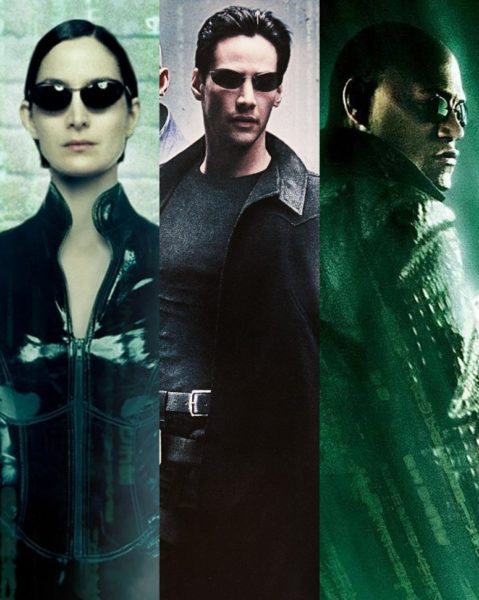When The Matrix opened in North America on March 31, 1999, the visionary sci-fi/action film written and directed by The Wachowskis became an instant box office smash and pop-culture phenomenon — spawning a slew of parodies/homages/imitators, burnishing the career of star Keanu Reeves and anointing its creators as Hollywood powerhouses nearly overnight.
Now, more than 22 years after the release of the generation-defining classic, Lana Wachowski has returned (sans her sister Lilly) with The Matrix Resurrections, the fourth film in the long-dormant series which is slated for release in theaters and on HBO Max December 22. Whether Resurrections can recapture the zeitgeist remains an open question — but with the film’s impending release, we decided to take a look back at the box office history of the game-changing franchise whose shockwaves continue to reverberate well into the 21st century.
The Matrix (1999)
Over its March 31-April 2 opening weekend, The Matrix took in $27.8 million from 2,849 screens in North America – at the time ranking it as the largest April opening ever. The long-gestating film emerged from a deal the Wachowskis made with Warner Bros., which signed the siblings to a multi-picture pact after purchasing their script Assassins (which eventually became the Sylvester Stallone-Antonio Banderas flop of the same name). The Matrix was only The Wachowskis’ second film after the progressive 1996 thriller Bound, which failed to ignite at the box office but captured the attention of critics for its tight plotting and deft updating of noir tropes.
Over the course of its theatrical life, The Matrix displayed strong legs at the box office, dipping less than 20% in its sophomore frame and remaining at No. 1 for three non-consecutive weekends. A true word-of-mouth hit, the film remained in theaters for more than five months and finished its run with north of $171 million in the U.S. and over $460 million worldwide off a budget reported at somewhere between $63 and $80 million. It ended the year as the fifth highest-grossing film of 1999, behind only Star Wars: Episode 1 – The Phantom Menace, The Sixth Sense, Austin Powers: The Spy Who Shagged Me and Toy Story 2.
The Matrix Reloaded (2003)
Filmed concurrently with the second Matrix sequel, Matrix Revolutions, on a combined reported budget of $300 million, The Matrix Reloaded was one of the most-anticipated films of 2003 – and its opening grosses reflected that pent-up demand. On May 15, its first day in theaters, the follow-up grossed an astonishing $42.5 million (including $5 million in 10 p.m. Wednesday night previews), ranking its opening day as the largest of all-time and the second-largest single-day gross after Spider-Man, which took in $43.6 million in its second day of release in 2002. (Note: The Reloaded opening-day record comes with a caveat, as Spider-Man didn’t include preview grosses in its first-day tally.) Reloaded also boasted the widest release ever at the time, debuting on a record 8,517 screens in over 3,600 locations.
By the end of its debut frame, Reloaded had scored the second-highest opening weekend ever in North America with $91.8 million, behind only Spider-Man (which took in a then-unprecedented $114.8 million over its first three days). But perhaps dinged by poor word-of-mouth and mixed reviews, the sequel proved to be a frontloaded hit, dropping 60% in its sophomore weekend – $36.9 million over the three-day Memorial Day frame and $45.6 million over the four-day – when it fell to No. 2 behind the Jim Carrey comedy Bruce Almighty. It continued to decline precipitously in its third weekend ($15.7 million, another nearly 60% drop) before eventually leveling out. Despite lacking the legs of its predecessor, Reloaded was no slouch, finishing its run with $281.6 million in North America. That made it the third-highest grosser of the year domestically after Finding Nemo and Pirates of the Caribbean: The Curse of the Black Pearl. Globally, the sequel took in a massive $739.4 million, including over $86 million in Japan alone.
The Matrix Revolutions (2003)
Released in November 2003, The Matrix Revolutions was even more poorly received by critics than its direct predecessor – and the film’s underwhelming first-weekend grosses also reflected dampened audience sentiment for the franchise. Over its opening frame, Revolutions took in just a little more than half of what Reloaded did, debuting to $48.5 million from 3,502 locations. While that was good enough for first place at the North American box office, it was widely considered a major disappointment and a sign that audience goodwill had deteriorated rapidly following Reloaded.
Revolutions crumbled from there, dropping a sharp 66% to $16.4 million in its second weekend when it finished in third place behind Elf and Master and Commander: The Far Side of the World. By the end of its domestic run, Revolutions had tallied just $139.3 million – over $30 million less than the first Matrix and more than $140 million less than Reloaded. It also plunged internationally, grossing $288 million versus Reloaded’s $460 million, resulting in a worldwide total of $427 million. For a sequel to one of the most beloved blockbusters of all time, it was a stunning reversal of fortune. The Wachowskis moved on to other projects, including the 2008 Speed Racer feature-film adaptation, 2012’s Cloud Atlas and 2015’s Jupiter Ascending. The Matrix franchise, meanwhile, would remain dormant for nearly two decades.



Share this post